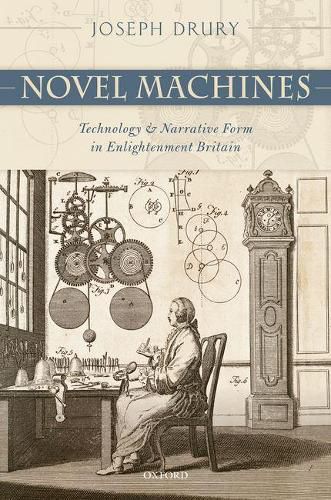Readings Newsletter
Become a Readings Member to make your shopping experience even easier.
Sign in or sign up for free!
You’re not far away from qualifying for FREE standard shipping within Australia
You’ve qualified for FREE standard shipping within Australia
The cart is loading…






Eighteenth-century fiction is full of mechanical devices and contrivances: Robinson Crusoe uses his gun and compass to master his island and its inhabitants; Tristram Shandy’s conception is interrupted by a question about a clock and he has his nose damaged at birth by a man-midwife’s forceps; Ann Radcliffe’s gothic heroines play musical instruments to soothe their troubled minds. By contrast, Novel Machines argues that the most important machine in any eighteenth-century novel is the narrative itself, when authors sought to organize their narratives according to the new ideas about nature, art, and the human subject that emerged out of the Scientific Revolution. Reading works by Eliza Haywood, Henry Fielding, Laurence Sterne, and Ann Radcliffe, Novel Machines tracks the consequences of the effort to transform the novel into an Enlightenment machine, and explores how eighteenth-century novelists adapted the novel’s narrative machinery, devising in the process some of the period’s most characteristic and influential formal innovations.
$9.00 standard shipping within Australia
FREE standard shipping within Australia for orders over $100.00
Express & International shipping calculated at checkout
Eighteenth-century fiction is full of mechanical devices and contrivances: Robinson Crusoe uses his gun and compass to master his island and its inhabitants; Tristram Shandy’s conception is interrupted by a question about a clock and he has his nose damaged at birth by a man-midwife’s forceps; Ann Radcliffe’s gothic heroines play musical instruments to soothe their troubled minds. By contrast, Novel Machines argues that the most important machine in any eighteenth-century novel is the narrative itself, when authors sought to organize their narratives according to the new ideas about nature, art, and the human subject that emerged out of the Scientific Revolution. Reading works by Eliza Haywood, Henry Fielding, Laurence Sterne, and Ann Radcliffe, Novel Machines tracks the consequences of the effort to transform the novel into an Enlightenment machine, and explores how eighteenth-century novelists adapted the novel’s narrative machinery, devising in the process some of the period’s most characteristic and influential formal innovations.